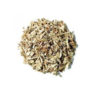Description
Constituents of hydrangea include flavonoids, kaempferol, quercetin, saponins and volatile oil. Its major minerals include sodium, calcium, iron, potassium, phosphorus and magnesium.
Hydrangea’s solvent properties are not limited to kidney stones. The herb has also been used to help dissolve bone spurs or calcification of muscles. It appears to help the body put calcium back into solution in the system.
Hydrangea has an anti-inflammatory action due to alkaloids which have a cortisone-like effect. This is useful for kidney infection and inflammation as well as for arthritis.
Possessing a blood purifying action, it has also been used to break up lumps and tumours.



 or 4 payments of
or 4 payments of